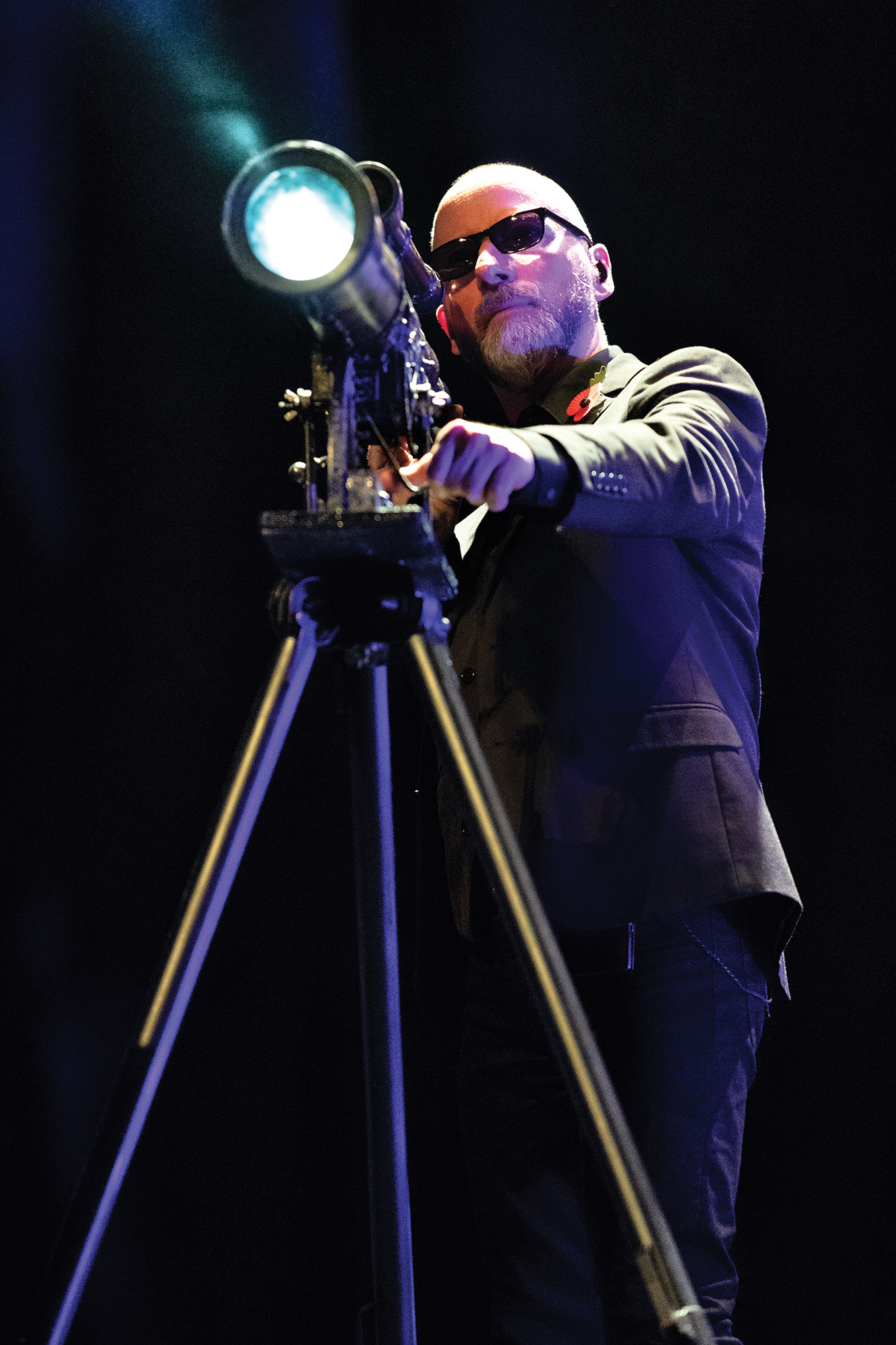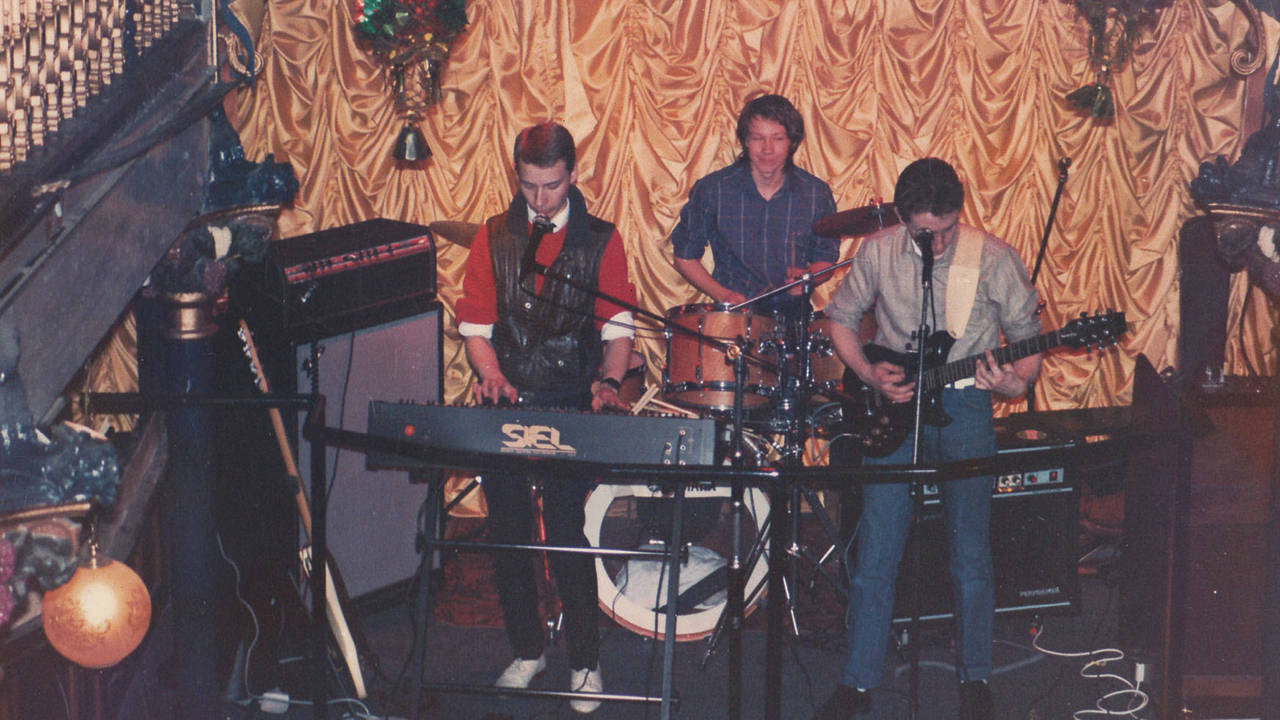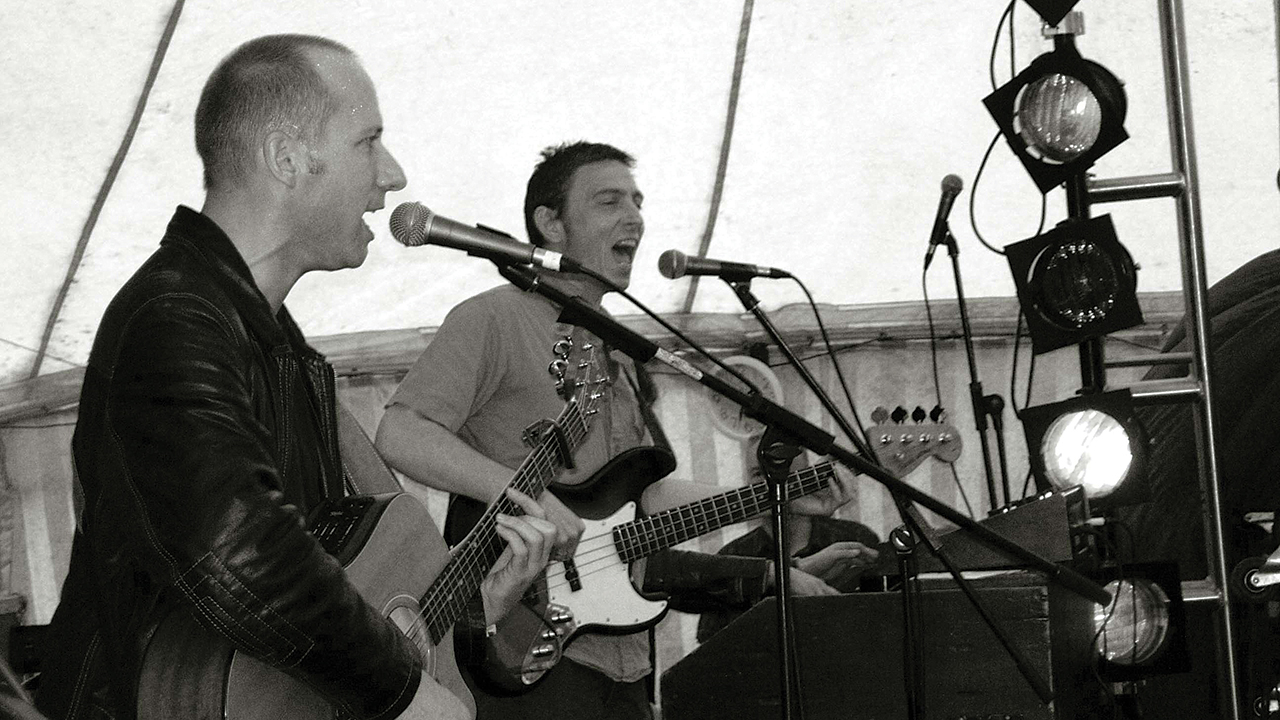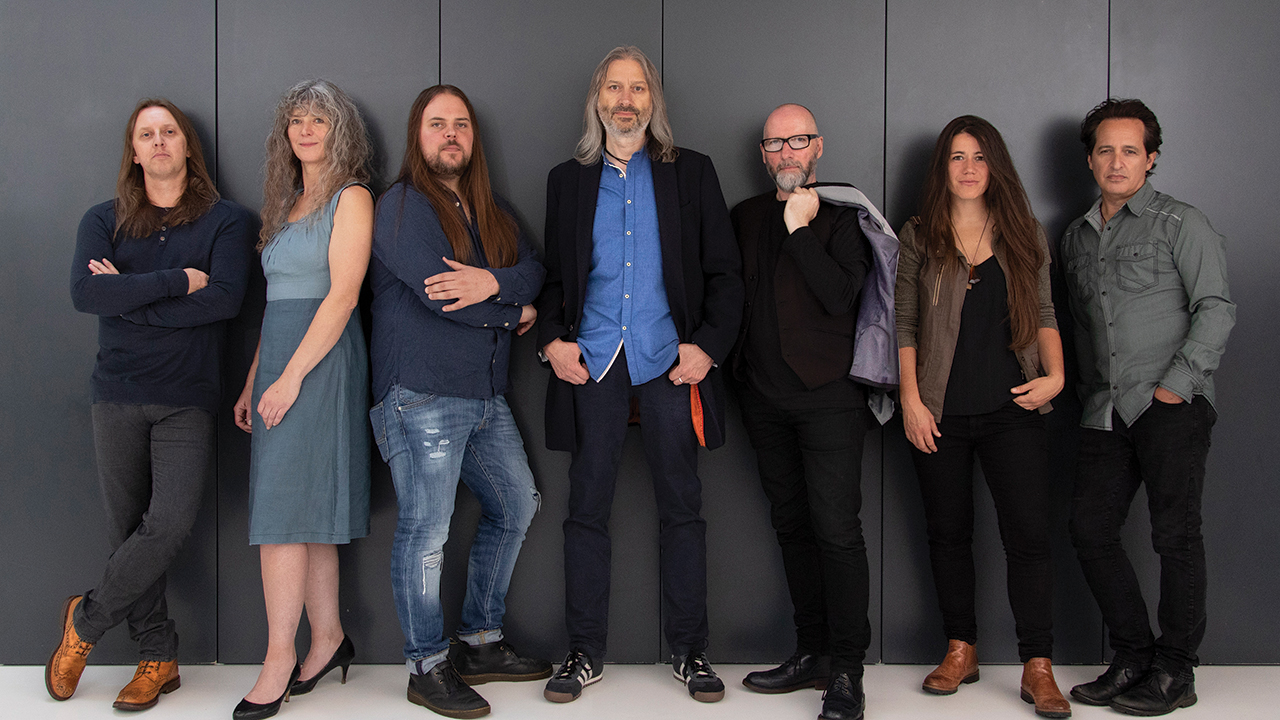It’s Friday July 17, 2009. David Longdon’s at Aubitt Studios, and he’s putting his heart and soul into this session. It’s just the way he does things.
He’s come down from Shrewsbury to Southampton for two days’ work for Big Big Train, this modestly successful prog rock band he’s just connected with. It was Aubitt’s owner and the band’s engineer, Rob Aubrey, who made the introduction. The year before, the unknown singer had recorded some vocals at Aubitt for The Old Road, the swansong solo album from IQ’s Martin Orford. Aubrey was impressed with his voice, attitude and confidence, and promptly called Big Big Train’s co-founder and chief songwriter, Greg Spawton, to enthuse about the new talent he’d stumbled upon.
The band already had a singer, and were coasting along nicely with some generously received albums. Then Aubrey played Spawton the Longdon recordings, and his imagination buzzed with the potential: the band’s music might transcend its current level, and their horizons might widen further, if it were Longdon delivering their songs. Spawton took a gamble and phoned him. Over the miles, the two started to hit it off. Changes were made, and a few months later, here they are.
A multi-instrumentalist with eclectic taste, Longdon will lay down mandolin, glockenspiel, psaltery, dulcimer and – his trump card – flute for the record tomorrow. Today, he’s in Aubitt’s vocal booth, lavishing The Underfall Yard with the golden tone that would soon come to move, captivate and astonish us all. In the control room, Aubrey sits back from his mixing desk and just soaks up this performance. Spawton almost can’t believe what he’s hearing – it’s sounding better than he ever could have hoped. The band’s then-bassist, Andy Poole, is there too, and captures this pivotal moment on video camera.
“Sometimes recording vocals is a real chore,” Aubrey tells Spawton over the music, “but this is just joyous.”
“I think he’s a real talent,” Spawton agrees, his mind reeling. “He’s dragging us out of our ‘bedroom’, isn’t he? It’s just the way he sings a word like ‘far’ [in the line ‘He could still see far’]. The tone of it, it’s just beautiful.”

That fateful day was some 12 years, eight albums, a clutch of sell-out shows and, now, an unthinkable tragedy ago. So many elements have brought Big Big Train to their high standing, key among them the abundant musical gifts, artistic sensibility, knowing humour and sheer character of their wonderful frontman. David Longdon’s accidental death in November – the terrible result of a fall at home in Nottingham – remains too cruel, too unfair and too desperately sad to fully process.
Proud father of daughters Amelia and Eloise, fiancé to his partner, artist Sarah Ewing, Longdon was just 56 and on the cusp of an exciting new chapter in his life. Big Big Train were still enjoying the afterglow of their second, acclaimed Top 40 album, Common Ground. They would open 2022 with the release of follow-up Welcome To The Planet, then embark on their most extensive tour yet, some 40 shows across Europe and the US. Longdon was also deep into work on a solo album. On his last day, just hours before his fall, he arrived home from the studio to Sarah, feeling ebullient, excited, happy. He was loved, he was in love, and he was doing what he loved. So richly deserved, this fulfilment had been a long time coming.
He was born David Ashley Longdon in Nottingham on June 17, 1965, to Vera and Eric Longdon. His Uncle Jack (later celebrated in song on Big Big Train’s English Electric), introduced him to poetry, to Mozart and Bach, to Johnny Cash and Glen Campbell. At school he took piano lessons, discovered his natural ear for music, and later took up guitar, bass, mandolin, and, for his A-Level studies, the flute.
He enjoyed the Beatles and the Stones, adored The Who (especially Pete Townshend) and fell under the spell of Bowie, The Sweet, Led Zeppelin, Pentangle. He was later spellbound by Pink Floyd’s Dark Side Of The Moon, Genesis’ Foxtrot and Supper’s Ready, and Fairport Convention’s self-titled debut, featuring Judy Dyble. Decades later, she would become a close friend of his, and as Dyble Longdon they would make one beautiful album together, 2020’s Between A Breath And A Breath.
In the 1980s, the budding performer’s teenage band, Greenhouse, played Who and Free covers in pubs, along with some early original material. “The first song I ever wrote was terrible,” he recalled later. “But it was a start. You write a few terrible songs and keep going. The more you write, the better you become.”

Music college didn’t work for him, so he switched to a course in Art & Design. After Greenhouse split he joined O’Strange Passion, a quartet purveying jangly art-rock, and a 1992 gig with his next band, The Gifthorse, won him an artist development deal with Rondor Music Publishing. The A&R man who signed him, Michael Stack, was struck by Longdon’s distinctive vocals, and his evolving writing talent. “I’m a big fan of soul singers,” Stack said later, “and David has so much soul in his voice. But what really got me were the lyrics. I still think he’s one of the most underrated lyricists this country has ever produced, because he gets the craft. There’s nothing in a David Longdon song that doesn’t belong there.”
Though nothing came directly of his brief time with Rondor, through a contact made there Longdon got the opportunity of a lifetime. In 1996 Genesis were about to start their Calling All Stations album. Phil Collins had left the band, and Mike Rutherford and Tony Banks were auditioning for a new vocalist. Longdon got seen, made it to the final shortlist of two, and ultimately – crushingly – lost out, to Stiltskin’s Ray Wilson.
Later, as Longdon’s star ascended in the world of progressive rock, critics and fans alike regularly noted his vocal similarity to Peter Gabriel, and his ties to Genesis. He would field these, patiently. “It’s something I’m noted for not actually having done,” he observed later. “When I was younger I had no reason to talk about it, because it meant nothing to the people in my life, or indeed to me. But it’s quite another matter when you’re fronting a progressive rock band. I think the Genesis DNA is present in the timbre of my voice. It’s most likely why I got the audition, and it was useful for Big Big Train when I arrived.”
Talent attracts talent. By that time he was also playing with chamber pop artist Louis Philippe, and while working on Philippe’s 1996 album Jackie Girl Longdon met and befriended guitarist Dave Gregory and double bassist/keyboardist Danny Manners, whom he would later introduce so invaluably into the Big Big Train fold. Still based in Nottingham, he would sporadically play shows with a collective of musician friends dubbed The Magic Club. They backed him on his self-produced solo album, Wild River, a record that showcased his ever-evolving vocal, instrumental and song-writing skills. Copies are rare and highly sought after now, but by the time of its quiet release in 2004, Longdon’s belief in a future in music was fading.

He was working at a college in Telford, teaching music technology. He was a family man, in a steady relationship and with a one year-old daughter, Amelia. Eloise was born in 2007, the same year her dad read an online article about Martin Orford, and his own struggles within the music industry. Longdon felt new warmth in the embers of his own dream, and contacted Orford. This led him to Aubitt Studios, to The Old Road and, ultimately – thankfully – to Big Big Train.
Listen again to the vocal prowess of David Longdon, right from the off. Listen again to his tightly arranged, a cappella harmonies on The Underfall Yard’s Evening Star, to the impassioned layers of Master James Of St George. Marvel at the soul he renders from that title track, and from Greg Spawton’s showstopping Victorian Brickwork. Pass through to Far Skies Deep Time’s low-key choker British Racing Green and its 17-minute prog monolith, The Wide Open Sea. From here on in, he conveyed songs – got to their emotional kernel – as only a rare few ever could.
His consummate flute playing soon became another sweet BBT trademark, and by English Electric he was bringing his own songs to the table – the mischievous, jubilant Judas Unrepentant, bittersweet folk tune Leopards, the harrowing A Boy In Darkness. Proggy key and time shifts were no problem for him, but he was just as comfortable delivering lighter, poppier moments – Make Some Noise, Alive, Common Ground’s pacy opener The Strangest Times. Rightly, he regularly featured high in ‘Best Vocalist’ polls, in Prog and beyond.
Longdon’s creative charge, encouragement and friendship spurred Spawton on, upped the ante, making Big Big Train a better band with better songs. When it finally came time for them to play live, in 2015, Longdon was a revelation. Over three sold-out shows at London’s Kings Place, and flanked by violinist Rachel Hall and guitarist Rikard Sjöblom, he led the band from the front. He pitched his performance just right – engaging affably with the audience, yet with a strong sense of the theatrical; he was the everyman with anything but an everyman’s talent.

When the band headlined The Night Of The Prog Festival in Loreley in July 2018 he rose to the occasion again, owning the runway that led into the thrilled crowd (“David gave a great performance at Loreley,” their drummer Nick D’Virgilio enthused later. “He was a real lead singer.”) Anyone who witnessed the band’s Grand Tour would have seen him continue to grow into the role – helming the epic Voyager and staple East Coast Racer, dropping to the floor under the dramatic weight of his own Brave Captain, donning his trademark pagan mask for Wassail. “As soon as I walk out on stage I become that person,” he said recently, “and I give in to that. But when I meet fans after shows I’m no longer that person. I’m me.”
The man the fans – the Passengers – met was indeed him: approachable, good-natured and intelligent, his warm, humorous, self-effacing style easing any nerves. Longdon had a lot of time for the Passengers. He enjoyed playing for them, and being with them, and he knew very well to never take them for granted. After his passing, it was a strange comfort to see so many of them posting online their cherished post-gig selfies with him.
Their messages, and the many tributes from friends, family, former students, fellow musicians and bandmates past and present, expressed the shock, grief and sadness so widely felt at the loss of a man who did everything with heart and soul. David Longdon was admired and respected for what he did, but liked and loved for who he was.
This article originally appeared on issue 126 of Prog Magazine.

